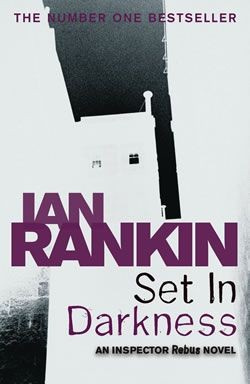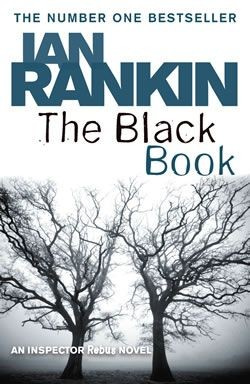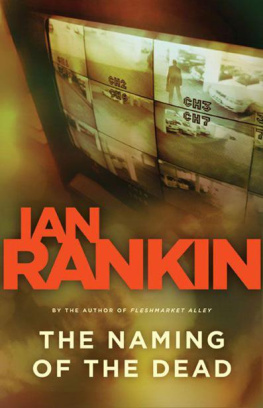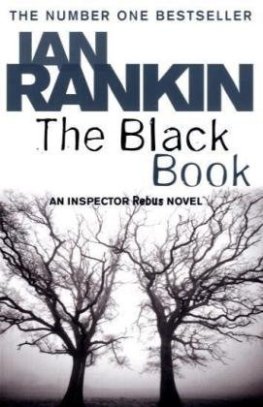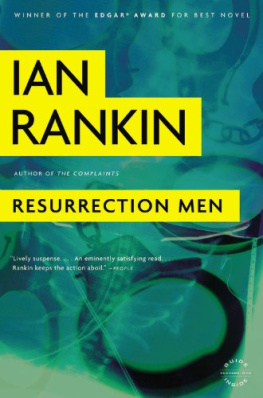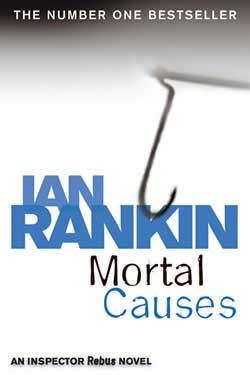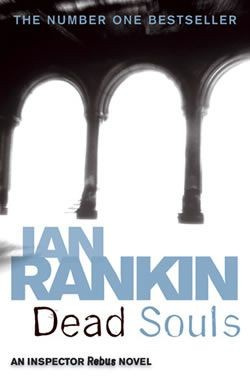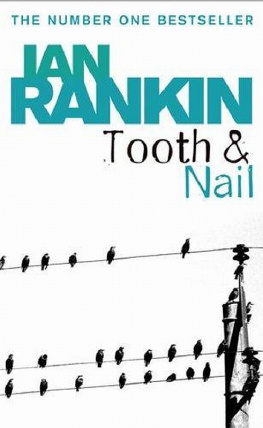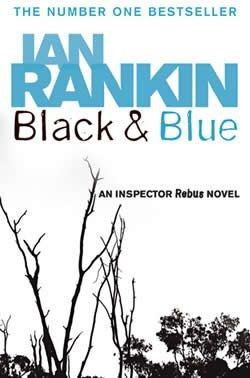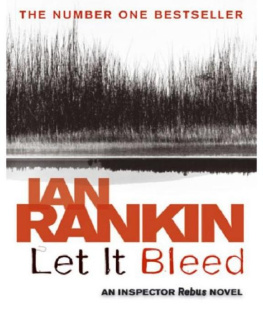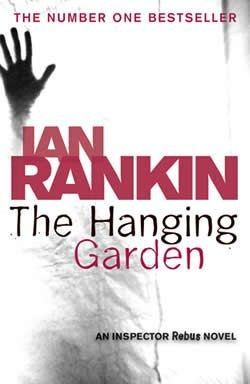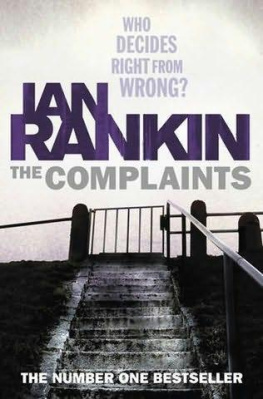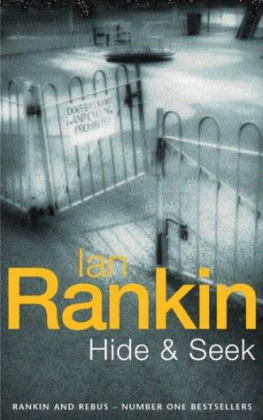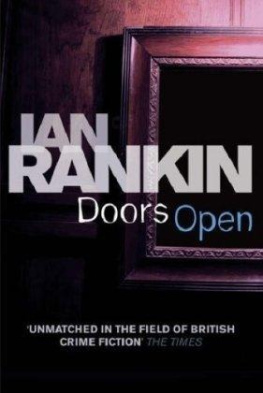Ian Rankin - Set in Darkness
Here you can read online Ian Rankin - Set in Darkness full text of the book (entire story) in english for free. Download pdf and epub, get meaning, cover and reviews about this ebook. year: 2008, publisher: Orion Books Limited, genre: Detective and thriller. Description of the work, (preface) as well as reviews are available. Best literature library LitArk.com created for fans of good reading and offers a wide selection of genres:
Romance novel
Science fiction
Adventure
Detective
Science
History
Home and family
Prose
Art
Politics
Computer
Non-fiction
Religion
Business
Children
Humor
Choose a favorite category and find really read worthwhile books. Enjoy immersion in the world of imagination, feel the emotions of the characters or learn something new for yourself, make an fascinating discovery.
- Book:Set in Darkness
- Author:
- Publisher:Orion Books Limited
- Genre:
- Year:2008
- Rating:3 / 5
- Favourites:Add to favourites
- Your mark:
- 60
- 1
- 2
- 3
- 4
- 5
Set in Darkness: summary, description and annotation
We offer to read an annotation, description, summary or preface (depends on what the author of the book "Set in Darkness" wrote himself). If you haven't found the necessary information about the book — write in the comments, we will try to find it.
Set in Darkness — read online for free the complete book (whole text) full work
Below is the text of the book, divided by pages. System saving the place of the last page read, allows you to conveniently read the book "Set in Darkness" online for free, without having to search again every time where you left off. Put a bookmark, and you can go to the page where you finished reading at any time.
Font size:
Interval:
Bookmark:

Contents
Set In Darkness
An Inspector Rebus Novel
IAN RANKIN
An Orion paperback
First published in Great Britain in 2000 by Orion
This paperback edition published in 2000 by Orion Books Ltd,
Orion House, 5 Upper St Martin's Lane, London WC2H 9EA
An Hachette Livre UK company
3 5 7 9 10 8 6 4 2
Reissued 2008
Copyright John Rebus Limited 2000
Introduction copyright John Rebus Limited 2005
The right of Ian Rankin to be identified as the author of this work has been asserted by him in accordance with the Copyright, Designs and Patents Act 1988.
All rights reserved. No part of this publication may be reproduced, stored in a retrieval system, or transmitted, in any form or by any means, electronic, mechanical, photocopying, recording or otherwise, without the prior permission of the copyright owner.
All the characters in this book are fictitious, and any resemblance to actual persons, living or dead, is purely coincidental.
A CIP catalogue record for this book is available from the British Library.
ISBN 978-0-7528-8363-2
Printed and bound in Great Britain by Clays Ltd, St Ives plc
The Orion Publishing Group's policy is to use papers that are natural, renewable and recyclable products and made from wood grown in sustainable forests. The logging and manufacturing processes are expected to conform to the environmental regulations of the country of origin.
www.orionbooks.co.uk
For my son Kit, with all my hopes, dreams and love
Though my soul may set in darkness
It will rise in perfect light,
I have loved the stars too fondly
To be fearful of the night.
Sarah Williams, 'The Old Astronomer to his Pupil'
INTRODUCTION
Serendipity.
According to the dictionary, it means the ability to make 'happy chance finds'. Serendip was the old name for Ceylon. Horace Walpole is credited with coining the term, after the fairy tale 'The Three Princes of Serendip', whose titular heroes were always stumbling across things they weren't looking for.
Serendipity.
It's one of my favourite words. Several of the Rebus novels have depended upon serendipity - most notably The Falls and Set in Darkness. Here's how it worked with Set in Darkness : I was on a promotional tour of the USA. Another day, another internal flight, this time from Philadelphia ... I don't recall the destination. Lacking reading material, I reached for the in-flight magazine. It featured a walking guide to Edinburgh. Hmm, I thought to myself, won't be anything here I don't already know.
I was wrong.
One of the sites mentioned was Queensberry House. I knew it to be situated at the foot of Holyrood Road, not far from the Queen's residence and across from where they were building a new HQ for the Scotsman newspaper. Queensberry House was going to be home to the new Scottish parliament building. I had scant knowledge of the place, thought it had been a barracks at one time, and latterly a hospital. At one time, that area of Edinburgh had boasted the city's finest homes, but when the 'New Town' had been constructed in the 1790s, a lot of the wealthier inhabitants had fled the 'Old Town'. Many of the abandoned buildings fell into disrepair and were eventually demolished. Queensberry House was a rare survivor. It had been home to the Duke of Queensberry, who had been responsible for the Act of Union between Scotland and England. (This had made him rather unpopular in Edinburgh: he was chased through the streets at one point and had to take refuge in the cathedral.)
But then the article told me something I didn't know: a member of the duke's family had one night killed, cooked and eaten one of the servants. Citizens saw this as a bad omen for the 'marriage' with England. The duke was chased through the streets again.
Like I say, news to me. I tore the article out and folded it into my pocket.
Back home in Edinburgh, I did some further research, and was able to arrange a tour of Queensberry House, thanks to a contact at Historic Scotland (who were involved in archaeological work on the site, prior to remodelling). A TV crew were shadowing me for a documentary about my working methods, which means I have proof that the following is not just a novelist's fancy. We were near the end of our private tour when I happened to mention the act of cannibalism. My guide was sceptical.
'Probably something for the tourists,' he said.
But then there was a shout from the basement. We headed down into the bowels of the house, to a room which had been stripped of its floorboards. The plaster and panelling had been removed from one wall, revealing a large stone arch, blocked by a metal plate.
'The original kitchen,' the shouter told us excitedly.
Then she tapped the fireplace. 'This must've been where he roasted the servant.'
Turned out she knew the story. It was documented in several history books. I asked if we could perhaps remove the metal plate, opening up the fireplace. This we did, revealing the space to the world for the first time in decades. I shone a torch into the furthest corner. Nothing there but cobwebs, of course, but still ... I was getting an idea. It was so extraordinary to me that I should have found out about this place from a magazine article picked up a thousand feet above Philadelphia, and be here on the very day when it was opened up again.
It was as if the story wanted to be told.
I'd had a similar experience with Mortal Causes , when a visit to Mary King's Close, buried beneath the City Chambers, had gifted me the opening to my novel. Now it seemed that I had the first scene of a new story, and this story would be about the nascent parliament, Scotland's first in three hundred years.
I had just signed a three-book deal, and I remember thinking that all three novels might share a political theme. I would invent a Member of the Scottish Parliament. He would be running for office in book one, elected in book two, and the parliament would be well under way in book three. I don't want to spoil Set in Darkness for new readers, so let's just say this plan never came to fruition: my narrative had other ideas. It works like that sometimes: characters to whom you assign minor roles demand a bigger part; projected major characters turn out to be unnecessary. Each story seems to shape itself, sometimes against the author's better judgement.
Until this book, Rebus had done most of his drinking at the Oxford Bar. In Set in Darkness I actually name some of that pub's real-life regulars, but also let Rebus off the leash, so he can drink in other real bars such as the Royal Oak and Swany's. Having returned to Edinburgh in 1996 (after ten years away), I'd been introduced to Swany's by a local bookseller. The first time he took me there, we sat down with a few of his cronies, including a gentleman called Joe Rebus. When told his name, I really did need a drink. He said he'd always been amused by the coincidence.
'And here's another,' he said. 'I live in a house on Rankin Drive.'
Serendipity isn't a big enough word for this. Joe and his family are the only Rebuses he knows of in Scotland; Rankin Drive is one of three streets in Edinburgh to feature my surname. What are the chances of a meeting of the two? You could run a Douglas Adams improbability drive on less.
When Set in Darkness was published, a BBC radio programme asked Donald Dewar - First Minister of the new Scottish Parliament - to review it. He found the book overly cynical about political process, and didn't like some of the writing. My phrase 'eyes like a frigate's hull' had him especially bemused. (I could have told him: grey and cold ... think grey, steely and cold.) One thing, however, did impress the urbane Mr Dewar: my access to the parliament site. He couldn't figure out how I knew so much. A few weeks later, I was heading north from London on the overnight train. Walking along the platform, I saw Dewar and his advisers seated around a table in the lounge car, so I took the table next to them. Eventually they fell silent, and started drifting off to bed. Donald came over and sat down across from me. We got talking. I asked how he knew who I was. Turned out one of his retinue had recognised me and warned against further chat, lest I use it in any future projects ...
Next pageFont size:
Interval:
Bookmark:
Similar books «Set in Darkness»
Look at similar books to Set in Darkness. We have selected literature similar in name and meaning in the hope of providing readers with more options to find new, interesting, not yet read works.
Discussion, reviews of the book Set in Darkness and just readers' own opinions. Leave your comments, write what you think about the work, its meaning or the main characters. Specify what exactly you liked and what you didn't like, and why you think so.

